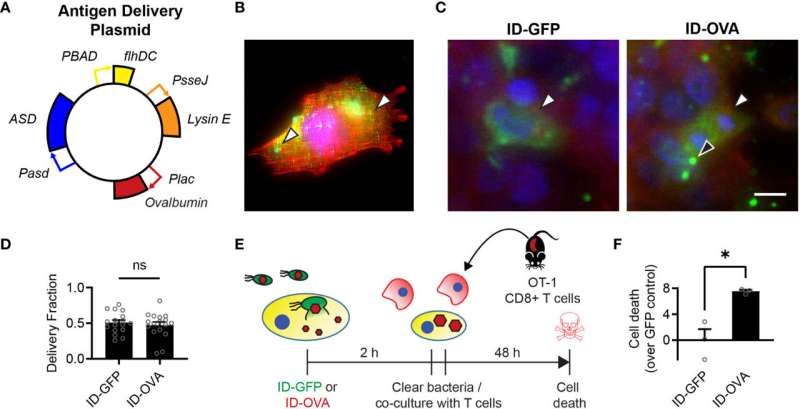This article has been reviewed according to Science X's editorial process and policies. Editors have highlighted the following attributes while ensuring the content's credibility:
fact-checked
peer-reviewed publication
trusted source
proofread
Proof-of-principle study shows immunity from routine vaccines has potential to fight cancer

A University of Massachusetts Amherst team has demonstrated "in theory" that a protein antigen from a childhood vaccine can be delivered into the cells of a malignant tumor to refocus the body's immune system against the cancer, effectively halting it and preventing its recurrence.
The bacteria-based intracellular delivering (ID) system uses a non-toxic form of Salmonella that releases a drug, in this case a vaccine antigen, after it's inside a solid-tumor cancer cell.
"As an off-the-shelf immunotherapy, this bacterial system has the potential to be effective in a broad range of cancer patients," writes senior author Neil Forbes, professor of chemical engineering, in a paper published Thursday, Oct. 5, in Frontiers in Immunology.
The research, carried out in the Forbes Lab at the Institute for Applied Life Sciences (IALS), offers promise toward tackling difficult-to-treat cancers, including liver, metastatic breast and pancreatic tumors.
UMass Amherst has filed for a patent that will be licensed to Ernest Pharmaceuticals, an IALS startup co-founded by Forbes, first author Vishnu Raman and bioengineer Nele Van Dessel, who developed the delivery system as a post-doctoral researcher in the Forbes Lab. They plan to seek FDA approval in an effort to start clinical trials within a few years.
"The idea is that everybody is vaccinated with a whole bunch of things, and if you could take that immunization and target it towards a cancer, you could use it to eliminate the cancer," Forbes explains. "But cancers obviously aren't going to display viral molecules on their surface. So the question was, could we take a molecule inside the cancer cell using Salmonella and then have the immune system attack that cancer cell as if it was an invading virus?"
To test their theory that this immune treatment could work, Forbes and team genetically engineered ID Salmonella to deliver ovalbumin (chicken egg protein) into the pancreatic tumor cells of mice that had been immunized with the ovalbumin 'vaccine.' The researchers showed that the ovalbumin disperses throughout the cytoplasm of cells in both culture and tumors.
The ovalbumin then triggered an antigen-specific T-cell response in the cytoplasm that attacked the cancer cells. The therapy cleared 43% of established pancreatic tumors, increased survival and prevented tumor re-implantation, the paper states.
"We had complete cure in three out of seven of the pancreatic mice models," Forbes says. "We're really excited about that; it dramatically extended survival."
The team then attempted to re-introduce pancreatic tumors in the immunized mice. The results were exceedingly positive. "None of the tumors grew, meaning that the mice had developed an immunity, not just to the ovalbumin but to the cancer itself," Forbes says. "The immune system has learned that the tumor is an immunogenic. I'm doing further work to figure out how that's actually happening."
In preliminary research, the team previously showed that injecting the modified Salmonella into the bloodstream effectively treated liver tumors in mice. They advanced their findings with the current research on pancreatic tumors.
Before clinical trials can begin, the researchers will repeat the experiments on other animals and refine the ID Salmonella strain to ensure its safety for use in humans. Liver cancer would be the first target, followed by pancreatic cancer.
"This is not just an academic exercise," says Forbes, whose grandfather—for whom Ernest Pharmaceuticals is named—died of prostate cancer. "I'm really trying to make a cancer therapy."
More information: Vishnu Raman et al, Intracellular Salmonella delivery of an exogenous immunization antigen refocuses CD8 T cells against cancer cells, eliminates pancreatic tumors and forms antitumor immunity, Frontiers in Immunology (2023). DOI: 10.3389/fimmu.2023.1228532



















